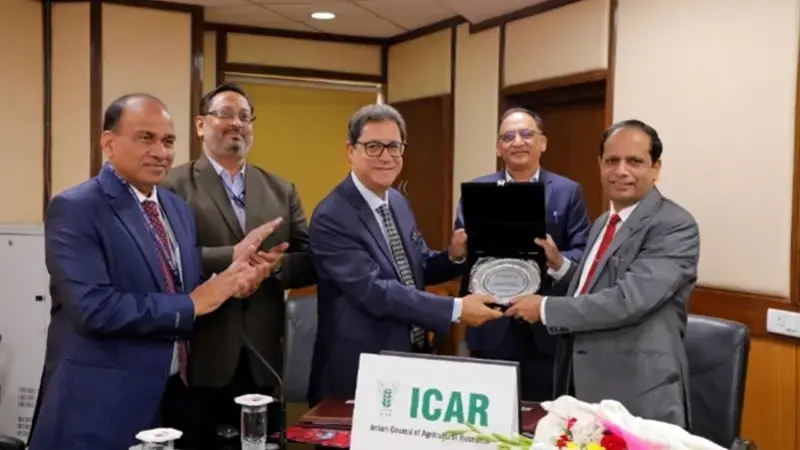Strengthening Partnerships in India

Putting our partners at the heart of our innovations right from the start is the highest priority for ICARDA. Our stakeholders' insights and experiences make sure that the groundbreaking innovations we deliver are demand-driven and targeted to the needs of the rural communities we serve.
New Delhi, India – December 2022 – ICARDA Director General and CGIAR Regional Director CWANA, Mr. Aly Abousabaa, was recently welcomed on a tour of ICARDA's India partners to discuss, revise, and improve current collaborative activities in climate-smart innovation. Mr. Abousabaa launched his tour by meeting with Dr. Himanshu Pathak, Director General of The Indian Council of Agricultural Research (ICAR), to sign the ICAR-ICARDA 5-year work plan (2022-2027) that will develop scientific and technical collaboration in agricultural research and extension for development. The proposed collaboration includes genetic innovation on improving yield, quality, and adaptation of food legumes and cereals, precision agriculture, and capacity building of national partners and farmers. The new work plan sets a milestone for reaffirming ICARDA and ICAR's long-standing and productive collaboration in providing livelihood resilience for India's rural communities in an increasingly hostile climate.
H.E Minister of Agriculture and Farmers' Welfare, Mr. Narendra Singh Tomar, and H.E Minister of Rural Development, Mr. Giriraj Singh, then hosted talks with Mr. Abousabaa, to discuss how the ICAR-ICARDA project on spineless cactus cultivation can be commercialized at scale for multiple uses, including food, fodder, fuel, and fertilizer. H.E. Minister Giriraj Singh urged ICARDA to launch a pilot project in partnership with ICAR to establish cactus as a viable option for biogas energy production, a bold initiative aimed at exploring the generation of renewable energy from agricultural waste.
Mr. Abousabaa was also invited by cabinet secretaries of relevant government departments and ministries, members of the India Planning Commission, ICAR directors, heads of CGIAR Centers based in India, and the One CGIAR Regional Director of South Asia Ms. Temina Lalani-Shariff, to discuss the progress on current ICAR-ICARDA projects. Throughout, ICARDA's research on crop diversification with improved legume varieties was singled out as having a particular impact in improving soil fertility and strengthening food and nutrition security for rural farmers.

Mr. Abousabaa and Dr. Jimmy Smith, Director General of ILRI, then met with Dr. Raj S Paroda, the Chairman of Trust for Advancement of Agricultural Sciences (TAAS), to discuss the relevance and benefits to national partners of the One CGIAR global research Initiatives, a portfolio of 33 integrated initiatives aimed at transforming food, land, and water systems in a climate crisis. Mr. Abousabaa then visited Prof. Ramesh Chand, Member of NITI Aayog (the Planning Commission of India), to discuss new approaches for strengthening dryland agri-food systems through integrated diversification such as the use of quality germplasm for breeding climate-smart traits into heat, drought, and pest resistant varieties, improved water management, and how selectively bred small ruminants can further diversify agri-food systems.
Throughout his tour, Mr. Abousabaa highlighted how One CGIAR, guided by our partners, can deliver demand-driven, proven, and affordable technologies to smallholder farmers affected by the intensifying climate crisis to improve their food and nutritional security and provide agricultural resilience and livelihoods for generations to come. South-South collaboration, precision agriculture, long-term training opportunities, exchange programs, and public-private partnership were all on the agenda as key to scaling new, climate-smart technologies while building the capacity of national partners to own, facilitate, and self-support future approaches. Mr. Abousabaa cited how, at COP27, the partnership between One CGIAR the Egyptian, FAO, and other CGIAR centers strongly amplified climate-smart agricultural innovations as essential complements of climate change adaptation and mitigation at the conference.
Outcomes from the discussions will now be integrated into current and future ICAR-ICARDA projects, as well as inform researchers on best practices and important considerations for farmers to ensure project solutions are relevant to partner needs at the market and household levels.

